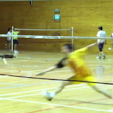You can induce fatigue in opponents is by forcing them to change direction as they return to their base position near center court - returning to base position is the first thing a player will do after making a shot.
If, as they return to base position, they must slow down, then push off in a new direction, their energy expenditure will increase dramatically.
The Triangle Concept
This is where the triangle concept of shot placement comes in. To force opponents to change direction as they return to their base position, imagine that the corner you've just hit to is one corner of a triangle, with the top side running along the net.
Your next shot must then go to one of the other corners of that triangle (B or C). This will force opponents to stop as they are returning to base position then change direction in order to reach the shuttle.
You should avoid hitting to the far, diagonal corner (D), because opponents can simply run straight through the base position in order to reach the shuttle. ]
Ibid. , Dick Moss Op. cit. badmintoncentral.com 2004. @
http://www.physicaleducationupdate.com/public/217print.cfm Fig. 1. The Triangle principle. This method avoids hitting to the corner D or the forehand corner.
Fig. 1. The Triangle principle. This method avoids hitting to the corner D or the forehand corner.'If the shot is hit to “A,” next shot should be to the other corners of the triangle— either “B” or “C,” forcing the opponent (in blue) to change directions (see red lines). Avoid hitting to “D,” which would allow opponent to run through the base position without stopping or changing direction.'Ibid. Dick Moss @ http://www.physicaleducationupdate.com/public/217print.cfm



No comments:
Post a Comment